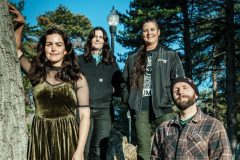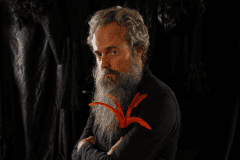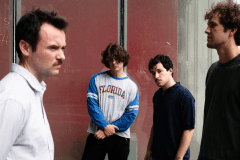Interview: Philip Jamieson of Caspian
I wasn’t particularly seeking out an album like Caspian’s Waking Season. In all honesty, the idea of instrumental post-rock produced the exact opposite of interest. I could not have been more wrong. With Waking Season, the Massachusetts five piece have come into their own, issuing a fully realized, absolutely beautiful album of electronic-laced post-rock bliss. Working with producer Matt Bayles, Caspian has transcended the usual quiet/loud dynamic by creating an immersive, atmospheric world all their own. Waking Season pulled me in from the first listen and hasn’t let go since, becoming one of my favorite albums this year.
Ghettoblaster was lucky enough to catch up to guitarist Philip Jamieson for a chat recently. Here’s what he said…
Interview conducted by Andrew Lampela
You guys have been around for quite a while now. What made you decide to go the instrumental route? What are some of your primary influences.
Our decision to be (primarily) instrumental was never our original intention. We had some vocalist ideas in mind during our formative stages but they never panned out, forcing us to play our first show instrumental. After we realized we didn’t need lyrics or a singer to communicate what we were going for, we stuck with what was working and decided to explore Caspian as an instrumental band. As for influences, we are coming from all over the place but there are a few bands like Tool, Massive Attack and Mogwai that we all seem to agree on. We all have a deep love for classical, ambient and folk music as well that has manifested itself in our approach to arrangements , dynamics and sound structure.
Can you explain to me the writing process? Is it difficult to write for three guitars? You have managed to balance them out with amazing results, no one guitar overstepping the other’s parts. I’m wondering how much you have to refine initial ideas to fit this line up.
The writing process is constantly evolving and we don’t have a set formula for composing. Back in the day we would get in a room, jam for hours and build songs around moments we culled from long improvisations. For Waking Season, I locked myself up in my basement for 8-9 hours at a time for months with as many instruments as I could get my hands on, manipulate them on a microsampler or get some noise loops going on guitar and put together some basic melodic ideas/arrangements. I’d get to a place I was comfortable with and then present them to the band and we’d fully explore and finish them together. That was the case for Waking Season, Procellous, Gone In Bloom and Bough, Halls of the Summer, High Lonesome and Collider in Blue. Long The Desert Mile was based around a figure Cal brought to the table, and Akiko, Hickory ’54 and Fire Made Flesh happened organically in our rehearsal space amongst the 5 of us. Writing with three guitars is something that comes extremely natural to Cal, Erin and I. We each have our own sensibilities and tastes, and there just seems to be a mysterious chemistry between us that I think is extremely hard to find and doesn’t always feel the need to be verbalized between the 3 of us when we are composing. Sometimes I won’t even know what they’re playing until we got to record many months later. Since none of us want to be the “lead guitarist” standing on stage with their tongue out and their foot on the monitor it makes it a lot easier to coalesce on ideas and work for the bigger sound. We let each other do our own thing without impinging on what someone else is doing because we respect each others’ talents and have a shared vision for how we want this band to sound.
You worked with Matt Bayles on this album. What did he bring to the table? Also, I understand this is your first time working with an outside producer. Was there a bit of initial shock? I’ve always found that once I get over that having complete control of my ideas isn’t always the best, mostly due to tunnel vision, that having a fresh take can really open things up. How did Bayles affect this material?
Working with Matt was one of the most terrifying, humbling and ultimately rewarding experiences I’ve personally ever had as a musician. He was present for 4 out of the 14 days of tracking and then spent 10 days mixing the record a few months later after he wrapped Minus The Bear’s new one. We had a very specific idea of what we were going for with this record so when it came to arrangements, structure and texturing/instrumentation he played traffic cop, employed his signature recording techniques and just made sure we got the best takes we were capable of. We got really deep into the process with him when Erin, Joe and I went to Red Room in Seattle to mix the record. I say “terrifying” earlier because Matt doesn’t fuck around when it comes to getting the job done, which means in part that he isn’t there to stroke your ego and be guy smiley. Looking back that is exactly what we needed to make this record come together, but of course at the time it was a pretty massive jolt out of our comfort zone since we’ve always worked with (very talented) friends and comrades. I am a mega control freak when it comes to the production of our records, and had a specific idea of how I wanted this album to “sound”, so for awhile there I thought about jumping off the bridge next to his studio just because it was so different than what I had envisioned. So yes I would agree with you – having a fresh take on things really made an enormous difference for the way this record sounds, especially when the person with the fresh take is an elite professional. He has a specific method of working and communicating that takes awhile to get used to, but with the amount of instrumentation we dumped into these songs, I don’t think we would have been able to get this done without his method. Bottom line is that Matt has one of the best ears in the music business, a catalogue of work that speaks for itself, and is a hard working genius when it comes to making albums sound professional and fully realized. I hope we work on future Caspian records together.
With the deluge of post-rock instrumental music in the last 5-6 years, I’ve had a hard time finding music in this style that does it for me, both in terms of not sounding like a clone and in actually pushing the genre. I think you have achieved both. How difficult is it to stay fresh and push yourselves?
That is kind of you to say. One thing that surprises a lot people is admitting that – when it comes to what’s happening in “post-rock” – we don’t have much of a clue since we don’t listen to this kind of music unless we are on tour playing with other post-rock bands or we are listening to what our friends are doing. We are always dead set on pushing ourselves but much more as it relates to the arc of our own catalog as opposed to what the current climate of “post-rock” is. So I’d say it isn’t difficult to push ourselves since staying fresh is vital to the health of our band as opposed to the state of a sub genre of music. Trying not to repeat ourselves has kept us on our toes and keeps things exciting.
Is it difficult to perform this material live? It’s incredibly layered, so I’m wondering if you compose with the live setting in mind?
I pre-record a lot of samples for our live show so it’s a combination of backing tracks and sounds I trigger from my Korg microsampler on stage. Since it’s a live environment we hope they mesh with the 5 piece as seamlessly as possible to create a powerful atmosphere. Increasingly over the years we compose exclusively with our records in mind since it’s a process that has far less limitations than a live show, and then hope that they translate effectively in a live setting.
What’s your favorite tour story?
That is always a tough one to answer to be honest since we’ve done close to 600 shows now and there’s just too many memories to filter through. I wouldn’t even know where to begin man. Playing in middle of nowhere China? Playing at midnight on a closed off highway in France? Meeting inspiring, passionate people at shows? Finding a foosball table upon arriving at a venue? It’s a tough one.
Now for the exciting one, what’s your least favorite tour story?
We got absolutely screwed by baggage fees by some evil airline on a flight to Athens in 2009 that was a rough blow. We’ve also had a few 20+ hour drives between back to back shows that have a way of numbing your brain beyond the pale and making you feel just downright empty. There were obviously those early tours where literally not a single person would show up to the show and the venue staff would treat you like shit and you’d sleep on someone’s sweaty dog in their basement next to dirty underwear. But honestly, it’s hard to find a lot to complain about on tour when you get the chance to play music for 2 or more people every night and share time with them.
This is one of the, and I hate to use this word, prettiest albums I’ve heard in the genre. Even the heavier parts are lushly beautiful. Is there anything that’s off limits in the writing process? The album has an amazing flow, and I guess I’m asking if you guys shy away from parts if they’re too heavy or too spaced out? I feel like, with the three guitar line up, you could get monstrously heavy with things, yet it’s very refreshing to hear a band pull back from going balls out for its own sake.
I mean… There are millions of things we do when messing around at practice that quite simply don’t have a place in what we are doing of course, but then again even some of those things increasingly have become fair game to legitimately consider when you’re on the hunt for new ideas the deeper you get into your career. In general we are open to whatever “feels” right and doesn’t require an explanation from the 5 of us. We tried the monstrously heavy thing a little bit on Tertia, and were pleased with the results, but for a band like us, we could get sucked down that black hole of becoming a post-metal band pretty easily and that is not exciting to us, especially since I feel like ISIS successfully explored the depths of that music already. When it comes to our darker, heavier inflections, I think we’ve always had a sound that comes across as more hopeful and yearning than it sounds no-exit, bitterly empty.
What are your tour plans behind the album? (Please say Ohio please say Ohio)…
We are wrapping up this *absolutely mind blowing* tour with Minus The Bear and Cursive tonight in Raleigh (that went through Cleveland 2 weeks ago sorry man), then taking 9 days off before doing another giant Europe run for 6 weeks in October/November. We’ll be doing a string of northeast dates with label mates o’brother and Moving Mountains in early December that we are really psyched about. Our number one priority is to get back out to the West Coast and do a longer UK tour so hopefully that comes together early next year in some capacity.
Anything you’d like to add?
This is a great chance to say a major word of thanks to everyone who is experiencing Waking Season the way we hoped they would and are reacting to it so positively. We literally had no idea how people would receive this record and the outpouring of support from our fans is what keeps this band going. We are so thankful that we get an opportunity to make the music we want to and that some people want to listen to it. It still blows our mind and always will. We still feel like we have something to prove to both ourselves and our fans every time we do a record so to get thumbs up from people goes a long way. Thank you thank you thank you THANK YOU.








Social Media